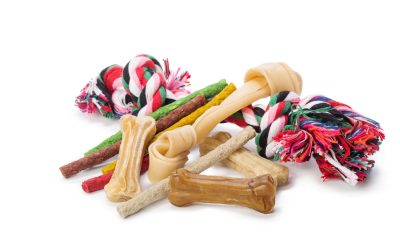Can dogs eat bananas?

A little banana each day goes a long way! Frozen bananas are a perfect to-go snack and provide energy and plenty of nutritional benefits, and helps teething pups. This fruit is not only popular with pet parents, but with dogs too! Bananas are sweet, provide energy, and contain no toxic components like some other fruits.
Dogs can’t digest cellulose, the primary substance in plant cell walls, but they can digest fruits and vegetables and enjoy eating them. Fruits contain plenty of phytonutrient antioxidants, and studies show that dogs with cancer may be prone to low levels of antioxidants. Phytonutrients also lessen oxidative damage and slow down the effects of aging. In this blog, we’ll examine banana benefits for dogs.
Are Bananas Safe for Dogs?
Bananas are highly nutritious and can be consumed by dogs, but your dog should only consume a little as with any other fruit or vegetable. When your dog consumes a bit of ripe banana, he’ll get the same benefits as humans get. If you’re wondering if a puppy can have bananas, you should ask your veterinarian since bananas are filling, and the added calories could interfere with your pup’s diet.
A ripe banana features glucose, fructose, and sucrose and contains around 103 calories. Bananas also are natural probiotics and may be beneficial in regulating the natural intestinal flora. This means that your pup will have a healthy digestive system if he consumes a small number of bananas each week.
Bananas feature plenty of vitamin C for optimal immune health. This helps keep blood pressure stable. They also provide anti-inflammatory benefits and may help to regulate the function of red blood cells, as well as help prevent heart disease in dogs.
Nutritionist Dr. Rob Hobson via Net Doctor, says that “The average (120 gram) banana contains 103 calories, 0.1g fat, 23.2g carbs, 20.7g total sugars, 1.7g fiber, and 1.4g protein,” and adds that bananas also contain significant levels of micronutrients which he breaks down as the following:
- Potassium: 396mg – This is 20 percent of your recommended daily allowance (RDA). This mineral is used for adequate muscle and nerve function as well as helping to lower blood pressure and helping with fatigue.
- Magnesium: 32mg – 9 percent of your RDA. This is needed to build healthy bones and help the body deal with stress. Magnesium is also associated with healthy muscle and nerve function as well as helping the body to convert food into energy.
- Thiamine (B1): 0.18mg – 16 percent of your RDA. This is necessary for energy production in the body, digestion of carbohydrates and heart function.
- Vitamin B6: 0.37mg – 27 percent of your RDA. “This is needed for energy production in the body and as well as maintaining a healthy immune and nervous system,” says Hobson.
- Folate (B9): 17 mcg – 8 percent of your RDA. This is good for preventing neural tube defects in unborn babies and is essential for a healthy immune system and preventing anemia.
- Vitamin C: 11mg – 14 percent of your RDA. “An antioxidant that helps to reduce the damage caused by excess free radicals in the body,” says Hobson. Vitamin C is also essential for healthy skin, wound healing, and immunity.

Fruits to Eat
Fresh foods are sometimes forgotten in canine diets, although fresh fruits and vegetables are necessary. A diet crafted with large amounts of fresh, organic raw fruits and vegetables is essential for providing optimal health for all dogs, seniors, and growing puppies.
There are over 1,300 different enzymes in your dog’s body. They all have different functions, such as digesting food or processing other waste materials in the blood. Enzymes are essential to life. All raw food contains enzymes, which are produced by living organisms.
“There is a connection between the strength of our immune system and our enzyme level. The greater the amount of enzyme reserves, the stronger our immune system, the healthier and stronger we will be,” explains Humbert Santillo, author of Food Enzymes: The Missing Link.
Enzymes are exclusive to raw foods only. This is because they are destroyed in food that is heated over 105 degrees Fahrenheit. (40.56°C) All food that is heat processed, roasted, fried, or baked does not feature enzymes. This is why it’s important to feed dogs a diet that’s crafted with raw and fresh fruits together with veggies.
If you supplement your dog’s diet with fruits like bananas and veggies, you’ll be helping to prevent nutrient deficiencies. This is very important if your pup has a nutrient deficiency since he may suffer from chronic health issues like the following:
- Skin issues
- Excessive shedding
- Stool easting
- Frequent vomiting
- Allergies
- Diarrhea
- Weight Loss
Benefits of Bananas for Dogs?
Bananas are beneficial for dogs because they contain potassium, magnesium, vitamin B6, vitamin C, manganese, biotin, fiber, and copper. Bananas also are great if your dog is suffering from gastrointestinal issues like diarrhea and nausea. With it being such a bland food and well-liked among babies, your pup will find this longstanding remedy great-tasting and helpful.
Keep in mind that a banana has lots of sugar, so you should reserve it as a treat or occasional light snack. If your dog has the following signs, try some mashed-up bananas to decrease vomiting and diarrhea. As usual, reach out to your vet if your dog is sick.
- Nausea
- Diarrhea
- Lack of appetite
- Drooling
- Abdominal pain
- Bloating
- Shock
- Dehydration
Can My Dog Consume Too Many Bananas?
If your furry best friend suffers from a vitamin deficiency and is low on potassium or other nutrients, he may benefit from added banana. That said, bananas given every day to a small dog breed may put him at risk for over-consuming calories and sugar.
Peeled bananas are the safest way to provide bananas for dogs. Banana peels are not toxic, but your dog may throw up or have diarrhea after eating a whole banana because the peel contains lots of fiber. Bananas should be peeled and then served in small slices.
Dogs can also be prone to constipation if they consume too many bananas. Too much of anything isn’t good. You’ll also need to consider the peel, which could be a dangerous choking hazard and hard to digest if consumed. Many pet parents think that their dogs benefit only from meat- but dogs benefit from fruit and veggies.
Veggies and fruit may not be considered essential for dogs by many pet parents, but they’re good for a pet’s well-being. They may help prevent cancer, prevent autoimmune diseases, metabolic issues, and cardiovascular problems, as well as help to prevent cognitive decline in senior dogs. Phytonutrients from fruits and veggies may also decrease oxidative damage and help combat aging.

How to Give Bananas to My Dog?
Studies show that dogs that consume a fiber-rich diet have improved gut microbiome diversity compared to dogs solely on meat diets. If you puree or mash up veggies and fruits like bananas for your dogs, it can help with digestion.
Dogs should not be fed banana peels because they’re difficult to digest. The peels are fibrous and dense and could lead to choking and even blocking the gastrointestinal system. Peels may also have been exposed to many toxic chemicals, so it’s always best to keep dogs away from them.
The AKC explains that you should “Be wary of peels. While the peels are not toxic to dogs, they are hard to digest and may cause a blockage. Even without the peel, feeding your pup too many bananas can cause stomach upset. If you have any questions or concerns about how much to give your dog, consult your veterinarian.”
Here are some suggestions on how to add bananas to your dog’s food:
- Mash a bit of the banana and add to your dog’s food
- Freeze the entire banana, and add it to a Kong toy for teething purposes.
- Combine banana, cheese, and peanut butter and feed as a healthy snack.
- Use banana as a dog training treat to reward
- You can also dehydrate or air-dry bananas and use them as a healthy treat.
In general, feeding your dog a small amount of banana may be suitable for him. Consider using banana pieces in treat form or frozen feeding pieces mixed with peanut butter.
You’ll need to experiment with a few banana recipes for dogs to see which one your furry best friend prefers the most! With lots of potassium, manganese, vitamin B6, vitamin C, fiber, biotin, and copper, you can’t go wrong! Bananas are a good way of supporting your dog’s well-being!
How often should you be taking your pet to the vet? Read more here.



